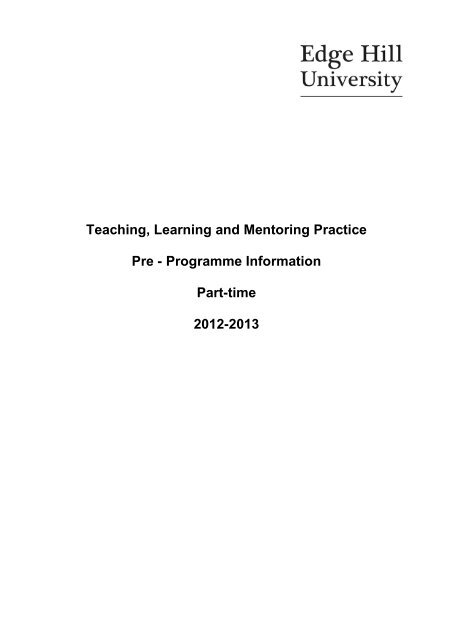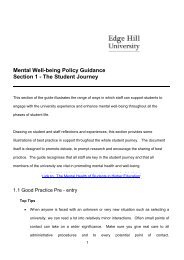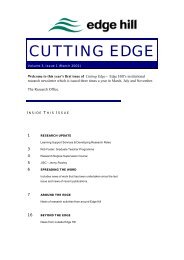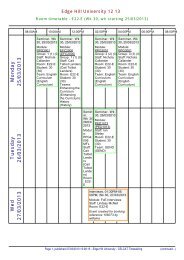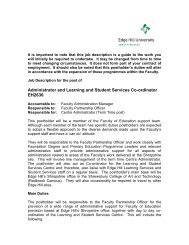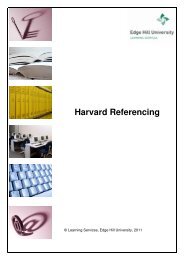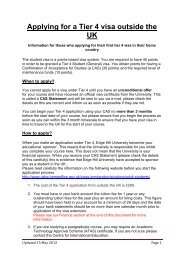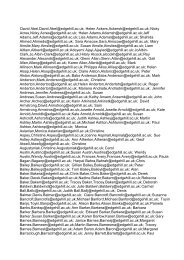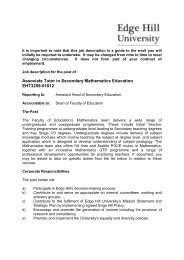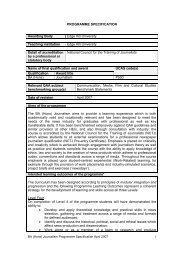Teaching, Learning and Mentoring Practice - Edge Hill University
Teaching, Learning and Mentoring Practice - Edge Hill University
Teaching, Learning and Mentoring Practice - Edge Hill University
Create successful ePaper yourself
Turn your PDF publications into a flip-book with our unique Google optimized e-Paper software.
<strong>Teaching</strong>, <strong>Learning</strong> <strong>and</strong> <strong>Mentoring</strong> <strong>Practice</strong><br />
Pre - Programme Information<br />
Part-time<br />
2012-2013
Welcome.<br />
The Programme team extends a warm welcome to students who will be<br />
joining the programme in September 2012. The BA (Hons) TLMP is an<br />
innovative programme designed for teaching assistants <strong>and</strong> support staff. The<br />
degree aims to provide students with a high quality education <strong>and</strong> training<br />
experience within a range of school <strong>and</strong> other educational contexts. In<br />
addition it aims to develop professional <strong>and</strong> vocational knowledge,<br />
underst<strong>and</strong>ing <strong>and</strong> skills. The programme is vocationally focused <strong>and</strong><br />
therefore relates to school based observations, experience <strong>and</strong> good practice.<br />
This booklet contains important information to prepare you for the start of the<br />
programme. Essential information such as term dates, contacts, general<br />
information related to your studies <strong>and</strong> school-based learning are outlined<br />
here <strong>and</strong> you will receive a comprehensive Programme H<strong>and</strong>book at<br />
induction.<br />
<strong>Edge</strong> <strong>Hill</strong> will be offering this Degree via the traditional St<strong>and</strong>ard route (face to<br />
face) <strong>and</strong> Flexible or online route <strong>and</strong> through part-time study. The St<strong>and</strong>ard<br />
route is via face-to-face taught sessions based at various Study Centres with<br />
some aspects of online learning. The Flexible route, for those studying online,<br />
involves 4 face-to-face days throughout the first year in addition to the<br />
studying via the Virtual <strong>Learning</strong> Environment ‘Blackboard’.<br />
Students will receive further details of Induction e.g. times <strong>and</strong> location before<br />
the programme begins.<br />
The team aims to ensure that you will find the programme enjoyable <strong>and</strong><br />
rewarding. We hope that it provides personal enrichment <strong>and</strong> assists both<br />
your professional <strong>and</strong> personal development.<br />
We are looking forward to meeting you at the start of the programme in<br />
September 2012.<br />
Very best wishes,<br />
The BA TLMP Team.<br />
2
Mission Statement<br />
<strong>Edge</strong> <strong>Hill</strong> is a major centre of excellence providing a high quality learning<br />
environment. Working with a range of partners <strong>and</strong> committed to equal<br />
opportunity, <strong>Edge</strong> <strong>Hill</strong> provides its students with the knowledge <strong>and</strong> skills to<br />
make key contributions to communities <strong>and</strong> organisations throughout their<br />
lives.<br />
Values<br />
<strong>Edge</strong> <strong>Hill</strong> seeks in all its relations to be:<br />
• Open, honest <strong>and</strong> professional<br />
• Supportive <strong>and</strong> welcoming<br />
• Forward looking<br />
<strong>and</strong> to respect <strong>and</strong> value diversity.<br />
“<strong>Edge</strong> <strong>Hill</strong> is a higher education institution seeking to provide an innovative,<br />
high quality <strong>and</strong> inclusive learning experience underpinned by a commitment<br />
to the advancement, dissemination <strong>and</strong> application of knowledge. <strong>Edge</strong> <strong>Hill</strong> is<br />
dedicated to developing individuals as skilled <strong>and</strong> autonomous learners in<br />
challenging <strong>and</strong> supportive environments.”<br />
3
BA (Hons) <strong>Teaching</strong>, <strong>Learning</strong> <strong>and</strong> <strong>Mentoring</strong> <strong>Practice</strong><br />
The degree in <strong>Teaching</strong>, <strong>Learning</strong> <strong>and</strong> <strong>Mentoring</strong> <strong>Practice</strong> provides an<br />
opportunity for teaching assistants <strong>and</strong> support staff to build upon their skills<br />
<strong>and</strong> knowledge in the field of primary or secondary education.<br />
Pathway A is intended for those who want to develop their professional work<br />
within the wider Children’s workforce. Pathway B is for primary support staff<br />
considering QTS <strong>and</strong> wish to develop more specialist knowledge in this area<br />
<strong>and</strong> Pathway C is intended for secondary support staff considering QTS in<br />
Secondary ICT.<br />
This is a four year, part-time degree that enables students to engage in workbased<br />
learning. It offers wider participation, flexible learning <strong>and</strong> is a valuable<br />
qualification in its own right. Part-time Students may exit this degree at the<br />
end of level 5 with the award of a foundation degree or may transfer to one of<br />
the QTS programmes, subject to interview/ availability.<br />
Students on the current degree have appreciated the way in which the<br />
programme fits in with family life <strong>and</strong> work commitments. They comment that,<br />
in addition to developing knowledge <strong>and</strong> essential skills, the programme has<br />
given them confidence <strong>and</strong> has helped them to underst<strong>and</strong> their supporting<br />
roles <strong>and</strong> responsibilities in working alongside their peers, teachers <strong>and</strong><br />
pupils.<br />
If you have any queries about the degree then please email Joanne Sutcliffe,<br />
the programme leader on sutclifj@edgehill.ac.uk<br />
4
The two different study routes<br />
As a new student, regardless of if you are studying face to face or online<br />
you will enrol with <strong>Edge</strong> <strong>Hill</strong> <strong>University</strong> at the start of your programme.<br />
To ensure you have all the information you need on enrolment day<br />
please visit the following website which will tell you about our ID policy<br />
as well as other important enrolment information.<br />
www.edgehill.ac.uk/welcome<br />
St<strong>and</strong>ard Route (face to face)<br />
The St<strong>and</strong>ard delivery route is the traditional form of delivery with face-to-face<br />
taught sessions with some online learning. Following your enrolment on to<br />
programme you will attend an <strong>Edge</strong> <strong>Hill</strong> centre one day per week during the<br />
afternoon <strong>and</strong> evening or during one full evening.<br />
Proposed enrolment day <strong>and</strong> delivery days for St<strong>and</strong>ard (part-time)<br />
route students in September 2012 are below. Induction days will be on<br />
your day of delivery during week beginning 1 st October 2012:<br />
Centre Enrolment date <strong>and</strong> time Time <strong>and</strong> day of delivery<br />
<strong>Edge</strong> <strong>Hill</strong> <strong>University</strong> 18<br />
Ormskirk<br />
th September 2012 1<br />
5.00-6.00<br />
st October 2012<br />
2.00-5.00<br />
Shrewsbury 4<br />
Training Centre,<br />
Shrewsbury<br />
th October 2012<br />
4<br />
4.00-5.00<br />
th October 2012<br />
5.00-8.00<br />
Holy Cross<br />
24<br />
<strong>University</strong> Centre,<br />
Bury<br />
th September 2012 1<br />
4.00-5.00<br />
st October 2012<br />
5.00-8.00<br />
Acre Lane, Wirral 4 th October 2012<br />
4<br />
4.00-5.00<br />
th October 2012<br />
4.00-5.00<br />
Flexible Route (Online)<br />
The Flexible route for those studying online involves 3 face-to-face days at<br />
<strong>Edge</strong> <strong>Hill</strong> in Ormskirk during your first year. The first day includes Enrolment,<br />
Induction <strong>and</strong> training for Blackboard 9.2, our ‘virtual learning’ environment;<br />
these are followed by a conference day at the beginning of each term to meet<br />
module tutors <strong>and</strong> be introduced to the module material <strong>and</strong> assessment<br />
criteria.<br />
For those students studying via the Flexible form of delivery (<strong>and</strong> not face to<br />
face), your first day is on:<br />
Friday 28 th September between 9.00a.m – 4.00p.m at <strong>Edge</strong> <strong>Hill</strong><br />
<strong>University</strong>, Ormskirk.<br />
Your enrolment will take place on this day at 10.00.<br />
5
Dem<strong>and</strong>s <strong>and</strong> expectations of your BA (Hons) Degree<br />
Although for most this is a part time degree, there are many dem<strong>and</strong>s of the<br />
programme. Most of you will be working full time <strong>and</strong> may also be the main<br />
carer in your family. However you are expected to attend every session<br />
during your time at <strong>University</strong> <strong>and</strong> attendance is closely monitored throughout<br />
your four years. Please consider carefully the following to ensure you get the<br />
most from your study.<br />
• Each module is taught for a specific number of hours, these are<br />
generally between 20-30 hours each module.<br />
• However in addition we expect another 300 notional hours to be spent<br />
on each module during the term. This would be broken up into:<br />
o Directed study tasks<br />
o Work based tasks<br />
o Additional reading<br />
o Assignment preparation time.<br />
Therefore it is necessary to spend at least another 8/10 hours each<br />
week on study.<br />
• Independent learning is extremely important <strong>and</strong> we would recommend<br />
you consider what this means. We do provide a lot of relevant<br />
information for you but we would consider this as only a starting point<br />
<strong>and</strong> want you to be pro-active in your own development. The team<br />
would advise you to start your work early <strong>and</strong> consider what is<br />
expected from you. We would also expect you to seek information out<br />
from your school <strong>and</strong> also from the library. This may not always be<br />
<strong>Edge</strong> <strong>Hill</strong>’s Library.<br />
• Wider reading is an important skill when studying for any Higher<br />
Education Degree <strong>and</strong> we would advise you to summarise <strong>and</strong> make<br />
notes about what you have read when you read it.<br />
• As a team we would also advise you to take advantage of any study<br />
skills programmes offered.<br />
6
What can the BA TLMP Degree programme lead to?<br />
The BA (Hons) <strong>Teaching</strong>, <strong>Learning</strong> <strong>and</strong> <strong>Mentoring</strong> <strong>Practice</strong> can lead to new<br />
work based opportunities such as the management of other teaching<br />
assistants, supervising classes or managing aspects of the SENCO’s role<br />
within school. It may also open up opportunities to become a learning mentor.<br />
Progression to QTS Honours Routes.<br />
This degree can also provide direct progression options to two Honours<br />
degrees leading to QTS:<br />
1. A Qualified Teacher Status option for Pathway B: BA (Hons) with<br />
QTS in Primary Education.<br />
2. A Qualified Teacher Status option for Pathway C: BA (Hons) ICT<br />
Secondary Education with QTS<br />
Places on progression routes are limited <strong>and</strong> not guaranteed <strong>and</strong> are<br />
subject to an application procedure <strong>and</strong> successful interview. On<br />
completion of the BA (Hons) TLMP students may also consider applying<br />
for PGCE <strong>and</strong> GTP programmes.<br />
7
The modules to be studied include:<br />
Code Title Credit<br />
rating<br />
Undergraduate Level 4<br />
TMP 1001<br />
TMP 1002<br />
CYP 1000<br />
TMP 1004<br />
TMP 1005<br />
Undergraduate Level 5<br />
TMP2000<br />
TMP 2001<br />
Pathway A<br />
TMP2002<br />
TMP2003<br />
TMP2004<br />
Pathway B<br />
TMP2005<br />
TMP2006<br />
TMP2007<br />
Pathway C<br />
TMP2008<br />
TMP2009<br />
Undergraduate Level 6<br />
CYP 3001<br />
TMP 3000<br />
TMP 3002<br />
TMP 3003<br />
Compulsory modules<br />
~ Training Needs Analysis<br />
~ Introduction to Reflective<br />
<strong>Practice</strong><br />
~ Theories of <strong>Learning</strong>,<br />
<strong>Teaching</strong> <strong>and</strong> Development<br />
~ <strong>Teaching</strong>, <strong>Learning</strong> <strong>and</strong><br />
<strong>Mentoring</strong> within the<br />
Curriculum<br />
~ Current issues in Education<br />
<strong>and</strong> Implications for <strong>Practice</strong><br />
Compulsory Modules<br />
~ Developing Reflective<br />
<strong>Practice</strong> in <strong>Teaching</strong>,<br />
<strong>Learning</strong> <strong>and</strong> <strong>Mentoring</strong><br />
~ Planning, Assessment <strong>and</strong><br />
Evaluation of <strong>Learning</strong><br />
Option Modules<br />
Children’s Workforce<br />
Professional route<br />
Inclusion<br />
Additional Needs<br />
Curriculum Frameworks<br />
Primary Education route<br />
~Creative Approaches to<br />
English <strong>and</strong> ICT<br />
~ Creative Approaches to<br />
Mathematics <strong>and</strong> Science<br />
~Creative Approaches to<br />
Foundation Subjects<br />
Secondary Education (ICT)<br />
route<br />
~ICT Pedagogy <strong>and</strong> <strong>Practice</strong><br />
~ ICT Knowledge <strong>and</strong><br />
Development<br />
Compulsory Modules<br />
Preparing for Research<br />
Work-Based Research<br />
Applying Theories of<br />
<strong>Learning</strong><br />
Leading in <strong>Teaching</strong> <strong>Learning</strong><br />
<strong>and</strong> <strong>Mentoring</strong> <strong>Practice</strong><br />
8<br />
20<br />
20<br />
20<br />
40<br />
20<br />
20<br />
20<br />
20<br />
20<br />
20<br />
20<br />
20<br />
20<br />
20<br />
40<br />
20<br />
40<br />
20<br />
20<br />
Details<br />
~ Work-based learning.<br />
~ Reflection on own learning <strong>and</strong><br />
development of academic skills<br />
~ Theories of <strong>Learning</strong>, <strong>Teaching</strong><br />
<strong>and</strong> Development<br />
~ Examining the core subjects in<br />
schools alongside an<br />
underst<strong>and</strong>ing of the role of the<br />
learning mentor<br />
~ Consideration around multiagency<br />
working in schools <strong>and</strong><br />
education.<br />
~ Work-based learning.<br />
Developing reflective practice<br />
through critical incidents<br />
~ Planning, Assessment <strong>and</strong><br />
Evaluation of <strong>Learning</strong><br />
~ Inclusive practice in schools<br />
~ Additional needs in schools<br />
~ Use of Curriculum Frameworks<br />
in schools<br />
Creative Approaches to Core<br />
(literacy, ICT, mathematics <strong>and</strong><br />
science) <strong>and</strong> Foundation subjects<br />
(history, geography, music, D&T.<br />
Art, PE, RE) for those who want to<br />
have an opportunity to progress to<br />
primary ITT<br />
ICT focused modules for those<br />
who want to have an opportunity<br />
to progress to Secondary ITT<br />
Introduction to research <strong>and</strong><br />
research methods<br />
Work-based project.<br />
Theories of learning in relation to<br />
teaching, learning <strong>and</strong> mentoring<br />
practice.<br />
Underst<strong>and</strong>ing leadership in<br />
practice within children’s workforce<br />
communities
Work Based <strong>Practice</strong><br />
Module TMP1001 Work Based <strong>Practice</strong> runs as a thread throughout Level 4<br />
<strong>and</strong> accumulates 20 credits. It helps to link together all the learning that takes<br />
place at Level 4.<br />
The Work Based <strong>Practice</strong> module is based on the Higher Level <strong>Teaching</strong><br />
Assistant St<strong>and</strong>ards (HLTA) but this does not mean that students are<br />
automatically awarded HLTA. You need to apply for HLTA via your Local<br />
Authority. Students who already hold HLTA status are exempt from TMP<br />
1001, 1002 <strong>and</strong> CYP 1003.<br />
In TMP 1001 <strong>and</strong> TMP 1002 you will engage learners in reflective practice<br />
<strong>and</strong> develop an ability to be analytical <strong>and</strong> evaluative. The work based<br />
practice module provides the core of a Professional Development Portfolio.<br />
The work-based practice element is the driver that underpins the central<br />
philosophy of the learning <strong>and</strong> teaching rationale for the programme. <strong>Learning</strong><br />
should be active <strong>and</strong> realisable in vocational terms.<br />
Work-based practice is a mechanism for learning. Within this context, it is<br />
centred on:<br />
• Reflection on work practices. It is about acquiring knowledge <strong>and</strong> a set<br />
of technical skills <strong>and</strong> it is about reviewing, learning from experience<br />
<strong>and</strong> setting targets for further development.<br />
• Action <strong>and</strong> problem solving within a working environment, centred on<br />
live projects <strong>and</strong> challenges to individuals <strong>and</strong> organisations. Workbased<br />
learning also sees the creation of knowledge as a shared <strong>and</strong><br />
collective activity, one in which people discuss ideas <strong>and</strong> share<br />
problems <strong>and</strong> solutions.<br />
• The acquisition of new knowledge <strong>and</strong> meta-cognition.<br />
9
Facilitator Role<br />
The Work Based <strong>Practice</strong> is facilitated <strong>and</strong> monitored by your school-based<br />
facilitator <strong>and</strong> <strong>Edge</strong> <strong>Hill</strong> tutor. Your facilitator will play a key role in supporting<br />
you on the programme.<br />
A named individual in your school/setting will act as a facilitator. This could be<br />
a teacher or experienced practitioner within the school/setting. Their<br />
responsibilities include:<br />
• facilitate a programme of learning experiences to meet your needs <strong>and</strong><br />
needs of the programme;<br />
• ensuring you have adequate <strong>and</strong> appropriate experiences in<br />
classrooms where you can undertake your work-based tasks;<br />
• liaising with <strong>and</strong> offering guidance to the class teacher <strong>and</strong> subject<br />
colleagues in relation to the programme requirements;<br />
• the provision of information, for example, about resource location,<br />
resource purpose, educational terminology, pupils individual learning<br />
needs;<br />
• helping you to acquire knowledge <strong>and</strong> skills which will enable you to<br />
work in partnership with teachers <strong>and</strong> other colleagues;<br />
• provide you with time <strong>and</strong> assistance to foster evaluation, selfevaluation<br />
skills <strong>and</strong> critical reflection;<br />
• develop <strong>and</strong> improve professional competences <strong>and</strong> confidence<br />
through constructive feedback;<br />
• recognising your particular personal needs showing sensitivity in<br />
meeting them.<br />
As part of the application process your Head teacher agreed to provide an<br />
appropriate facilitator from within the setting. The facilitator will normally:<br />
• be a teacher or experienced practitioner able to take responsibility for<br />
the facilitation of appropriate learning opportunities;<br />
• be accessible to you;<br />
• be a good communicator with effective interpersonal skills who is able<br />
to work with you in identifying developmental targets related to<br />
professional practice;<br />
• be someone who is committed to contributing to the culture of<br />
professional learning in a school <strong>and</strong> willing to engage in facilitator<br />
briefings <strong>and</strong> partnership with the <strong>University</strong>.<br />
10
Useful Contacts:<br />
Programme Leader<br />
Joanne Sutcliffe 01695 584591 sutclifj@edgehill.ac.uk<br />
Course Leader (full time)<br />
Christine Lewis 01695 650827 Christine.Lewis@edgehill.ac.uk<br />
Course Leader (part time)<br />
Tony Hooson 01695 584681 hoosonr@edgehill.ac.uk<br />
Senior Lecturer<br />
Maureen Judge 01695 650841 judgem@edgehill.ac.uk<br />
UGPD Administrator<br />
Michael Anderson 01695 584434 Michael.Anderson@edgehill.ac.uk<br />
11
Recommended Reading<br />
You will receive all Programme materials <strong>and</strong> resources during your Induction<br />
session. Each module is accompanied by a comprehensive resource booklet<br />
which contains all requires essential reading relating to that particular module.<br />
All items on the reading lists will be available from <strong>Edge</strong> <strong>Hill</strong>’s Library.<br />
The following books are highly recommended for purchase to support Year 1<br />
modules.<br />
Walton, A., <strong>and</strong> Goddard, G. (Eds) (2009) Supporting Every Child: A course<br />
book for foundation degrees in teaching <strong>and</strong> supporting learning. Exeter:<br />
<strong>Learning</strong> Matters<br />
Watkinson, A. (2009) The essential guide for experienced teaching assistants.<br />
London: Fulton<br />
Alfrey, C. (2004) Underst<strong>and</strong>ing Children’s <strong>Learning</strong>: A Text for <strong>Teaching</strong><br />
Assistants. London: Fulton<br />
Bold, C. (2005) Supporting <strong>Learning</strong> <strong>and</strong> <strong>Teaching</strong>. London: Fulton<br />
Other readings:<br />
Balshaw, M., <strong>and</strong> Farrell, P. (2002) <strong>Teaching</strong> Assistants: Practical Strategies<br />
for Effective Classroom Support. London: Fulton<br />
Cottrell, S. (2008) The Study Skills H<strong>and</strong>book. Palgrave McMillan<br />
Judge, B., Jones, P., <strong>and</strong> McCreery, E. (2009) Critical Thinking Skills for<br />
Education Students. Exeter: <strong>Learning</strong> Matters<br />
Parker, M. et al (2009) A toolkit for the Effective <strong>Teaching</strong> Assistant. London:<br />
Sage<br />
Ritchie, C., & Thomas, P. (2005) Successful Study: Skills for <strong>Teaching</strong><br />
Assistants. London: Fulton<br />
Tyrer, R. Gunn, S., Lee, C. et al (2004) A Toolkit for the Effective <strong>Teaching</strong><br />
Assistant . London: Chapman<br />
12
PRECOURSE TASK:<br />
It would be really useful if you could find an interesting article or a piece of<br />
current research that considers recent developments regarding the context<br />
<strong>and</strong> role of teaching assistants <strong>and</strong> support staff in education - it could be a<br />
TV programme that you have seen or a website or blog that you have read.<br />
Whatever you find, you will be able to share with others at your induction on<br />
the week of the 1 st October 2012.<br />
APPLICANTS<br />
IMPORTANT – FAILURE TO ACT ON THIS INFORMATION MAY RESULT<br />
IN THE WITHDRAWAL OF YOUR PLACE AT EDGE HILL<br />
Please ensure that your clearances (qualifications) <strong>and</strong> references have been<br />
received by the Admissions Unit as soon as possible. Please note that you<br />
cannot enrol with <strong>Edge</strong> <strong>Hill</strong> until all clearances <strong>and</strong> references have been<br />
processed <strong>and</strong> approved.<br />
Failure to provide these by the end of OCTOBER will result in your offer<br />
of a place being withdrawn. It is your responsibility to ensure that all<br />
information asked for is provided as soon as possible.<br />
You should not contact the Admissions Unit to establish the situation<br />
regarding clearances <strong>and</strong> references once they have been forwarded, as this<br />
will cause a delay in processing the information. Please wait for the<br />
Admissions Unit to contact you.<br />
If you have not already supplied the Admissions Office with copies of your<br />
previous examination results, please arrange to send in photocopies of your<br />
certificates or computer slips as soon as possible.<br />
If you no longer have your certificates or computer slips you can<br />
either<br />
provide a letter on official letterhead, signed by the head<br />
teacher/examinations officer of the school/college/university where they were<br />
taken, indicating the subject(s), level(s), grade(s) attained <strong>and</strong> the date taken<br />
or<br />
contact the examination board to request copies of your certificates to be sent<br />
either to yourself or to <strong>Edge</strong> <strong>Hill</strong> (please note that this may take up to six<br />
weeks). Any costs incurred to be met by the applicant.<br />
13
We have listed below some of the examination boards:<br />
Assessment <strong>and</strong> Qualifications Guildford<br />
Alliance (AQA)<br />
AQA<br />
Stag <strong>Hill</strong> House Tel: 01483 506506<br />
Guildford Fax: 01483 300152<br />
Surrey email:postmaster@aqa.org.uk<br />
GU2 7XJ website:www.aqa.org.uk<br />
(for NEAB, AEB, JMB, SEG)Manchester<br />
AQA Tel: 0161 953 1180<br />
Devas Street Fax: 0161 273 7572<br />
Manchester email:postmaster@aqa.org.uk<br />
M15 6EX website: www.aqa.org.uk<br />
Edexcel Foundation<br />
Stewart House Tel: 0870 240 9800<br />
32 Russell Square Fax: 0207 758 6960<br />
London email:enquiries@edexcel.org.uk<br />
WC1B 5DN website:www.edexcel.org.uk<br />
Oxford, Cambridge <strong>and</strong> RSA Examinations (OCR)<br />
Head Office Tel: 01223 552552<br />
1 Regent Street Fax: 01223 552553<br />
Cambridge email:helpdesk@ocr.org.uk<br />
CB2 1GG website: www.ocr.org.uk<br />
Welsh Joint Education Committee (WJEC)<br />
245 Western Avenue Tel: 029 2026 5000<br />
Cardiff Fax: 029 2057 5994<br />
CF5 2YX email: exams@wjec.co.uk<br />
website: www.wjec.co.uk<br />
If your examination board is not listed above, please contact the Admissions<br />
Office for further guidance. Alternatively, check out “The Education<br />
Authorities Directory <strong>and</strong> Annual” in your local library.<br />
14


